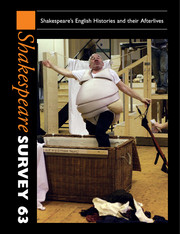Book contents
- Frontmatter
- Shakespeare the Historian
- The Decline of the Chronicle and Shakespeare's History Plays
- Rites of Oblivion in Shakespearian History Plays
- Richard II's Yorkist Editors
- Mapping the Globe: The Cartographic Gaze and Shakespeare's Henry IV Part 1
- Falstaff's Belly: Pathos, Prosthetics and Performance
- ‘And is Old Double Dead?’: Nation and Nostalgia in Henry IV Part 2
- Performing the Conflated Text of Henry IV: The Fortunes of Part Two
- Medley History: The Famous Victories of Henry the Fifth to Henry V
- Georgic Sovereignty in Henry V
- The Troublesome Reign, Richard II, and the Date of King John: A Study in Intertextuality
- The Trials of Queen Katherine in Henry VIII
- ‘Watch Out for Two-handed Swords’: Double-Edged Poetics in Howard Barker's Henry V in Two Parts (1971)
- Daunted at a Woman's Sight?: The Use and Abuse of Female Presence in Performances of the Histories as Cycles
- The RSC's ‘Glorious Moment’ and the Making of Shakespearian History
- Shakespeare as War Memorial: Remembrance and commemoration in the Great War
- Shakespearian Biography, Biblical Allusion and Early Modern Practices of Reading Scripture
- Filling in the ‘Wife-Shaped Void’: The Contemporary Afterlife of Anne Hathaway
- Shakespeare and Machiavelli: A Caveat
- Shame and Reflection in Montaigne and Shakespeare
- Playing the Law for Lawyers: Witnessing, Evidence and the Law of Contract in The Comedy of Errors
- Shakespeare's Narcissus: Omnipresent Love in Venus and Adonis
- Surface Tensions: Ceremony and Shame in Much Ado About Nothing
- ‘Remember Me’: Shylock on the Postwar German Stage
- ‘Dangerous and Rebel Prince’: A Television Adaptation of Hamlet in Late Francoist Spain
- What Shakespeare Did with the Queen's Men's King Leir and When
- Re-cognizing Leontes
- Shakespeare Performances in England 2009
- Professional Shakespeare Productions in the British Isles, January–December 2008
- The Year's Contribution to Shakespeare Studies 1 Critical Studies
- 2 Shakespeare in Performance
- 3 Editions and Textual Studies
- Index to Volume 63
Richard II's Yorkist Editors
Published online by Cambridge University Press: 28 November 2010
- Frontmatter
- Shakespeare the Historian
- The Decline of the Chronicle and Shakespeare's History Plays
- Rites of Oblivion in Shakespearian History Plays
- Richard II's Yorkist Editors
- Mapping the Globe: The Cartographic Gaze and Shakespeare's Henry IV Part 1
- Falstaff's Belly: Pathos, Prosthetics and Performance
- ‘And is Old Double Dead?’: Nation and Nostalgia in Henry IV Part 2
- Performing the Conflated Text of Henry IV: The Fortunes of Part Two
- Medley History: The Famous Victories of Henry the Fifth to Henry V
- Georgic Sovereignty in Henry V
- The Troublesome Reign, Richard II, and the Date of King John: A Study in Intertextuality
- The Trials of Queen Katherine in Henry VIII
- ‘Watch Out for Two-handed Swords’: Double-Edged Poetics in Howard Barker's Henry V in Two Parts (1971)
- Daunted at a Woman's Sight?: The Use and Abuse of Female Presence in Performances of the Histories as Cycles
- The RSC's ‘Glorious Moment’ and the Making of Shakespearian History
- Shakespeare as War Memorial: Remembrance and commemoration in the Great War
- Shakespearian Biography, Biblical Allusion and Early Modern Practices of Reading Scripture
- Filling in the ‘Wife-Shaped Void’: The Contemporary Afterlife of Anne Hathaway
- Shakespeare and Machiavelli: A Caveat
- Shame and Reflection in Montaigne and Shakespeare
- Playing the Law for Lawyers: Witnessing, Evidence and the Law of Contract in The Comedy of Errors
- Shakespeare's Narcissus: Omnipresent Love in Venus and Adonis
- Surface Tensions: Ceremony and Shame in Much Ado About Nothing
- ‘Remember Me’: Shylock on the Postwar German Stage
- ‘Dangerous and Rebel Prince’: A Television Adaptation of Hamlet in Late Francoist Spain
- What Shakespeare Did with the Queen's Men's King Leir and When
- Re-cognizing Leontes
- Shakespeare Performances in England 2009
- Professional Shakespeare Productions in the British Isles, January–December 2008
- The Year's Contribution to Shakespeare Studies 1 Critical Studies
- 2 Shakespeare in Performance
- 3 Editions and Textual Studies
- Index to Volume 63
Summary
The possibility that Shakespeare's Richard II was the play described as ‘the play of the deposing and killing of King Richard II’ and performed on the eve of the Earl of Essex's rebellion in February 1601 has assured its status as New Historicism's poster boy. The association with Essex makes the play into a perfect exemplar of the Elizabethan theatre's doomed gestures towards subversion; if it didn't exist, we would have to invent it (which, of course, perhaps we have). But even as criticism has emphasized the radical energies of a play in which a lawful king is deposed without any immediate consequence for his enemies, the editorial tradition has sought to neutralize its political challenge. As this article will show, we read Richard II in texts that are much less comfortable with the fact of the transfer of sovereigns dramatized in the play than its earliest printed versions. Furthermore, in always preferring to reprint the 1608 text (Q4) over the popular Elizabethan editions, recent editors have tended to sacralize Richard's kingship, and to neutralize those aspects of the early texts that most challenge a mystificatory myth of unitary monarchical authority. In this delicate play of shifting allegiances and changing sides, few editors have easily followed Shakespeare's own examples of York, Northumberland and even roan Barbary, in accommodating themselves to the Lancastrian rule of Bullingbrook as Henry IV. Rather than seeking the play’s political charge in putative early modern performances, therefore, this article describes a Ricardian tradition of editing Richard II in the late twentieth century, an uninvestigated editorial consensus silently complicit in minimizing the play’s political charge.
- Type
- Chapter
- Information
- Shakespeare Survey , pp. 37 - 48Publisher: Cambridge University PressPrint publication year: 2010
- 1
- Cited by

